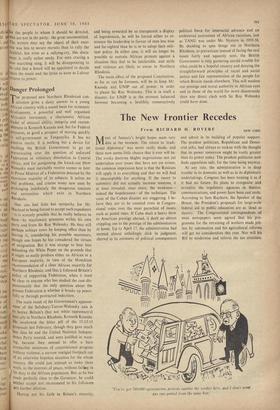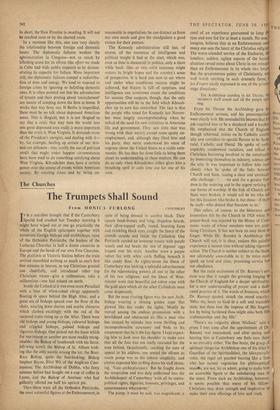The New Frontier Recedes
From RICHARD H. ROVERE
NEW YORK
Mos-r of January's bright hopes seem very dim at the moment. The return to 'tradi- tional diplomacy' was never really made, and there now seems little chance that it ever will be. The troika doctrine blights negotiations not yet undertaken over issues that have not yet arisen; the common impression here is that the Russians will apply it to everything and that we will find it unacceptable for anything. If the resort to summitry did not actually increase tensions, it at least revealed, once more, the weakness— indeed the hopelessness—of the technique. The costs of the Cuban disaster are staggering. I be- lieve they are to be counted even in Congres- sional votes over the most parochial of issues, such as postal rates. If Cuba dealt a heavy blow to American prestige abroad, it dealt an almost crippling one to the prestige of the administration at home. Up to April 17, the administration had seemed almost unfailingly slick In judgment, shrewd in its estimates of political consequences and adroit in its building of popular support. The prudent politician, Republican and Demo- crat alike, had always to reckon with the thought that its power tomorrow might be vastly greater than its power today. The prudent politician now finds opposition safe, for the time being anyway.
At any rate, the administration is in deep trouble in its domestic as well as in its diplomatic undertakings. Congress has been treating it as if it had no future. Its plans to reorganise and revitalise the regulatory agencies in finance, communications, and power have been cast aside. According to Sam Rayburn, the Speaker of the House, the President's proposals for large-scale federal aid to public education are as 'dead as slavery.' The Congressional correspondents of most newspapers seem agreed that his 'pro- gramme for the retraining of workers made job- less by automation and his agricultural reforms will get no consideration this year. Nor will his Bill to modernise and reform the tax structure.
'You've got 240,000 spontaneous protests against the verdict here, and I don't want any two posted from the same box.'
In short, the New Frontier is receding. It will not be reached soon or by the charted route.
In a moment like this, one sees very clearly the relationship between foreign and domestic issues. The diplomatic failures weaken the administration in Congress—not so much by br4ding scorn for its efforts (the eflort we made in Cuba had wide public support) as by demon- strating its capacity for failure. More important still, the diplomatic failures compel a redistribu- tion of time and energy. We tend to respond to foreign crises by ignoring or belittling domestic ones. It is often pointed out that the adventurism of tyrants and their prating about 'encirclement' are means of tamping down the fires at home. It works that way here, too. If Berlin is imperilled, there must be no talk about depressed American areas. This is illogical, but it is not illogical to say that a crisis that may turn the world into one great depressed area really is more important than the crisis in West Virginia. It demands more of the President's energies, and dealing with it— by, for example, beefing up certain of our thin- ned-out defences— may justify the use of political credit that might under happier circumstances have been used to do something satisfying about West Virginia. Khrushchev does have a certain power over the course of events within American society. By creating crises and by being un- reasonable in negotiations he can distract us from our own needs and give the standpatters a good excuse for their posture.
The Kennedy administration still has, of course, all the resources of intelligence and political insight it had at the start, which was, even as time is measured in politics, only a short while back. One or two solid successes might restore its bright hopes and the country's sense of perspective. It is hard just now to see where and under what conditions success might be achieved, but history is full of surprises, and intelligence can sometimes create the conditions for success. One suspects, though, that the only opportunities will be in the field which Khrush- chev up to now has controlled. The fact is that the people who voted for Kennedy last Novem- ber were largely uncomprehending when he talked of the need for new initiatives in American life and government. They saw little that was wrong with their society except some spotty un- employment, and, although they liked him and his party, they never understood his sense of urgency about the United States as a viable com- munity. He has thus far done little to bring them closer to understanding in these matters. He can do so only when Khrushchev either gives him a breathing spell or calls time out for one of his own.



































 Previous page
Previous page